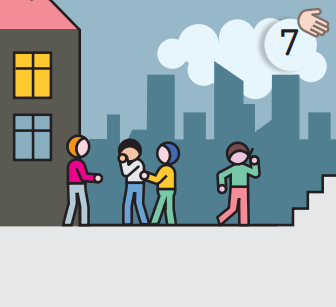Station 7: Showing Civil Courage
«Why is a supportive network important?» Domestic violence is not a private matter! A supportive network can play an important role and help those affected to escape the cycle of violence.
Violent relationships are paralyzing. Many victims feel helpless and alone. Family members, friends, neighbors, or the wider community are often the first to see, hear, or learn about incidents of violence. A supportive environment can play a crucial role in helping victims break free from the cycle of violence.
Providing the right support to victims isn’t easy and can be emotionally challenging. But doing nothing only helps the person committing the violence. It’s often hard for outsiders to understand why victims endure violence for so long. From an outside perspective, leaving a violent relationship might seem like a simple solution. However, the situation for victims is complex. A breakup often doesn’t end the violence and may even escalate it. Emotional and financial dependency, shared children, or legal hurdles can also make separation extremely difficult. It’s important to offer victims understanding, patience, and support.
Showing courage and paying attention can make a significant difference. This is especially important because domestic violence often follows a recurring pattern known as the cycle of violence (Station 5). This cycle makes it harder for victims to leave the relationship, especially when a « honeymoon phase » follows an incident of violence, raising hopes for change. This hope can make it difficult for victims to accept outside help, as they may believe the situation is improving. That’s why it’s vital for those around them to act quickly and provide support as soon as signs of violence are detected. Breaking out of the cycle of violence alone is incredibly difficult.
How important is the environment for those affected by domestic violence?
Listen to the audio of a person affected by domestic violence.
This audio was recorded in German. You can find a text version of the audio in English below.
We would like to remind you that this audio does not represent the experiences of all affected individuals, as every experience is unique.
Open here to view the audio content as text
Let me briefly introduce myself: My name is Michelle. I am 34 years old, a single mother, and a survivor of domestic and sexual violence. I fought for six and a half years for my rights and for myself. It was a very challenging and exhausting time. After those 6.5 years, there was finally a conviction. I am incredibly grateful for that because, in Switzerland, it is far from guaranteed that such cases result in a conviction.
It was not always easy. There were moments when I no longer wanted to keep going, when I simply couldn’t. Many times, I was on the verge of giving up and wished for everything to just end. I could barely stand myself anymore. But today, I can say that I am doing very, very well again.
For outsiders, it is often difficult to understand someone affected by violence, but it is incredibly important to try. At some point, the person affected will share what happened to them. When that moment comes, it is crucial to simply be there – without accusations like, «I told you so.» Instead, you should show empathy and say: «Everything will be okay. I am here. Can I help you in any way? What do you need? I am here for you.» Accusations help no one.
I still vividly remember when I ended up in the hospital with a broken collarbone. That’s when it all began: «Michelle, you have to do this. Michelle, you have to handle that. Michelle here, Michelle there. Michelle, Michelle, Michelle.» It felt like an avalanche crashing down on me. I didn’t have a single moment for myself, not even a quiet minute to catch my breath. Eventually, I had to say: «Stop. What actually happened? Where am I now? What should I do next?»
For outsiders, it is crucial not to put pressure on those affected. Truly, don’t. Just be there. They will come to you when they are ready. And if they go back to the abuser – let them. You cannot control them; it’s their free will. But don’t give up on them. Don’t say: «If you go back one more time, don’t come to me again.» Saying that only pushes them further away.
If they know they always have support – that their family and friends are behind them – it gives them strength. It empowers them and might even help them take the step to file a report. Because they know they are not alone, they are supported.
When I was trapped in the cycle of violence, I was often alone. I wished for someone who would understand me, who wouldn’t judge me no matter how naive I seemed in those moments. Someone I could always turn to, even if I went back to the abuser again.
Yes, I know it’s not easy for outsiders. But please, try without accusations. Don’t abandon them, no matter how many times they return to the abuser. Be there for them. Write to them or call them occasionally. Even if they don’t respond – someday they will. And when that moment comes, you need to be ready to be there.
The path out of violence requires courage and support, but it is possible.
Continue to Station 8: «Finding Ways Out».



